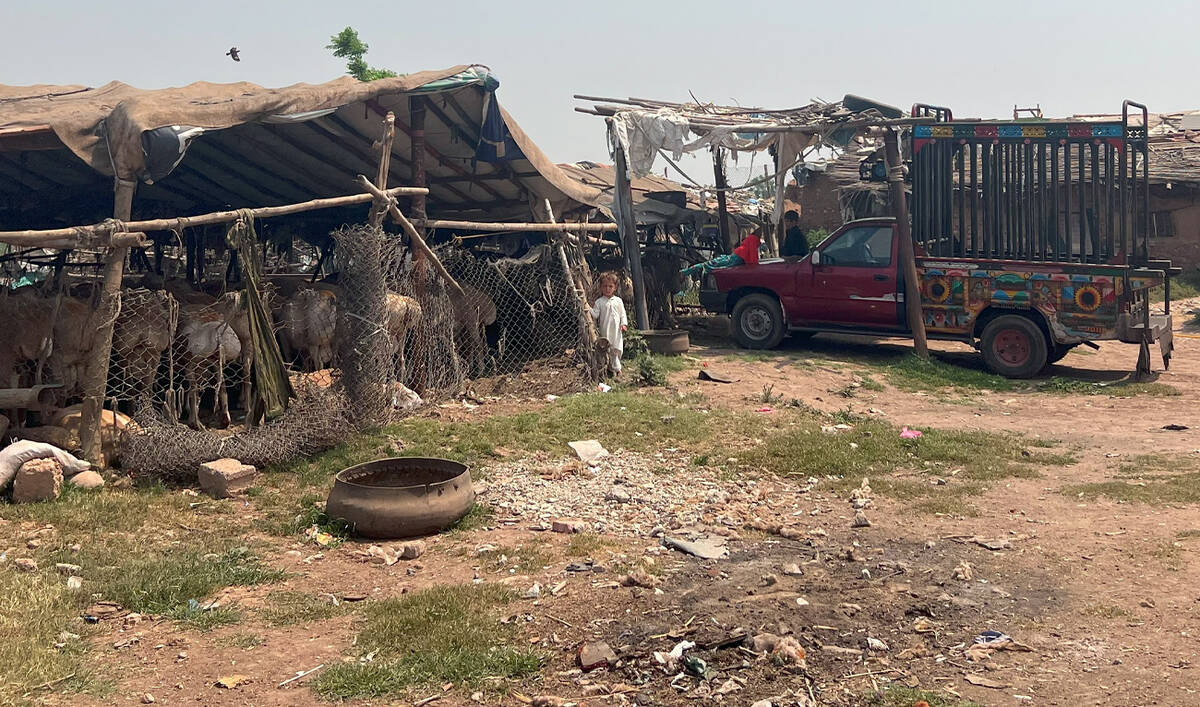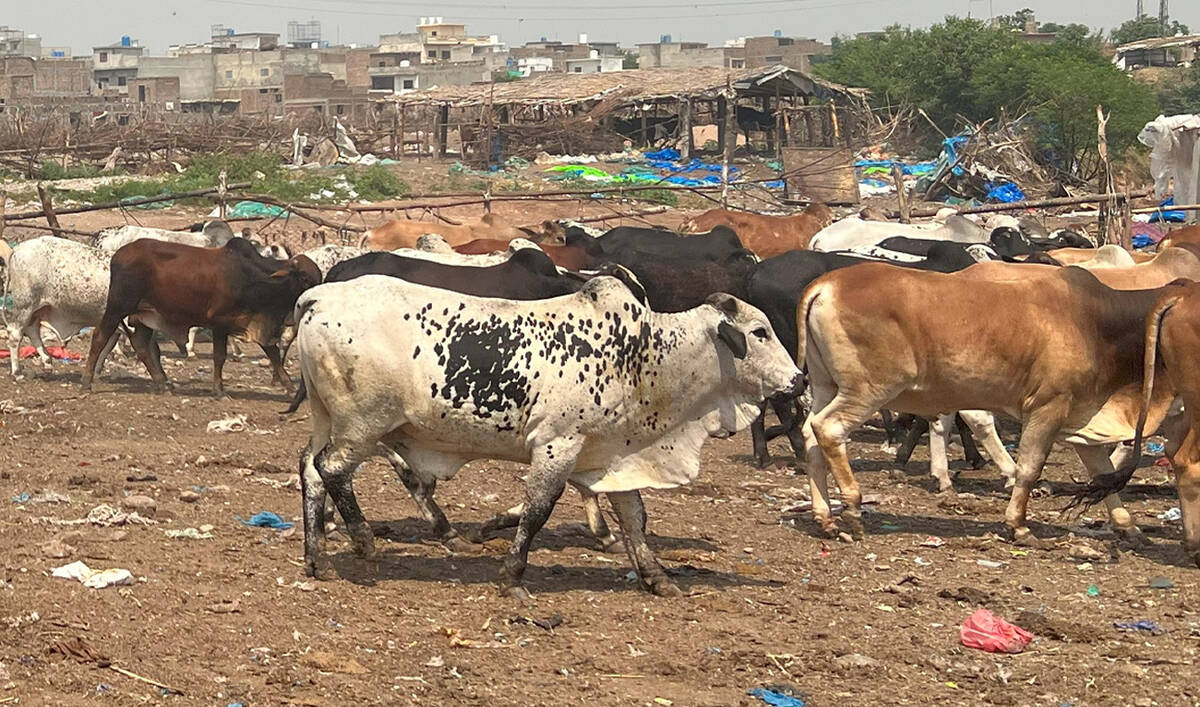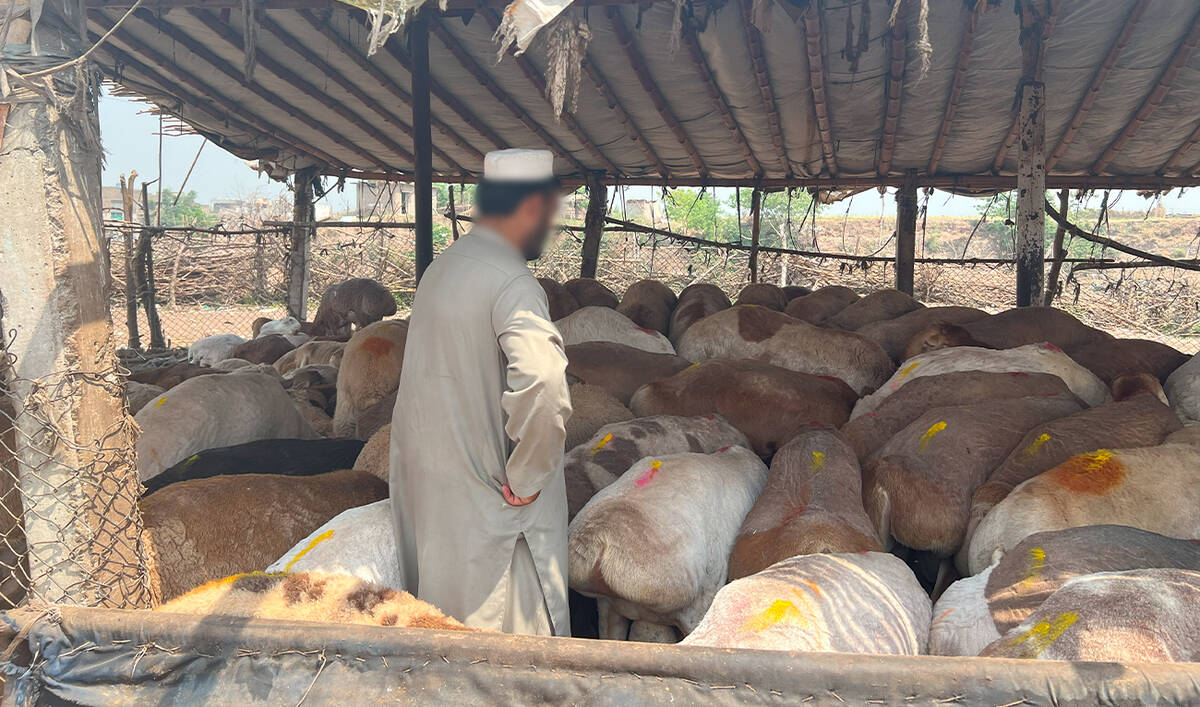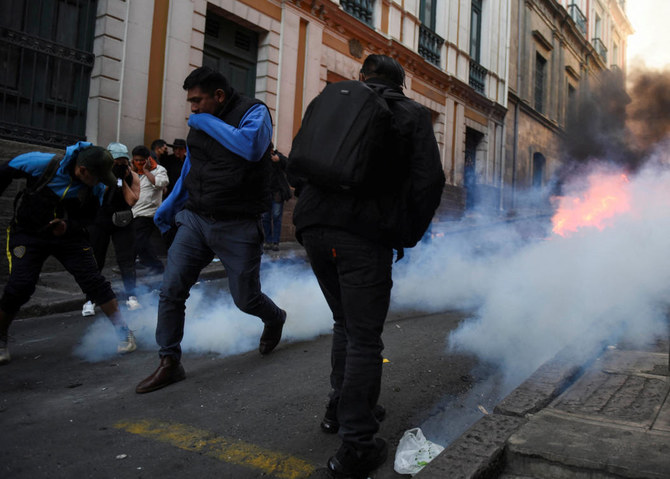La Paz: Two Bolivian army leaders were arrested Wednesday after soldiers and tanks took up position in front of government buildings in what President Luis Arce called an attempted coup.
The troops and tanks entered Plaza Murillo, a historic square where the presidency and Congress are situated, in the afternoon, prompting global condemnation of an attack on democracy.
One of the tanks tried to break down a metal door of the presidential palace.
Surrounded by soldiers and eight tanks, the now-dismissed army chief General Juan Jose Zuniga said the “armed forces intend to restructure democracy, to make it a true democracy and not one run by the same few people for 30, 40 years.”
AFP reporters saw soldiers and tanks pulling back from the square shortly after. The uprising lasted about five hours.
Zuniga was captured and forced into a police car as he addressed reporters outside a military barracks later on Wednesday, footage on state television showed.
“General, you are under arrest,” Deputy Interior Minister Jhonny Aguilera told Zuniga.
A second senior military officer Juan Arnez Salvador, who was head of the Bolivian navy, was also arrested Wednesday night.
Salvador’s arrest was announced by Interior Minister Eduardo del Castillo, who said that Zuniga and Arnez are “two military coup leaders who tried to destroy democracy and the institutionality of our country and failed.”
Speaking from a balcony of the government palace, Arce told hundreds of supporters that “No one can take away the democracy we have won.”
He had urged “the Bolivian people to organize and mobilize against the coup d’etat in favor of democracy,” in an earlier televised message to the country alongside his ministers inside the presidential palace.
He fired Zuniga and Salvador and swore in a new set of military leaders.
Before he was arrested, Zuniga told reporters that the president had told him to stage an uprising, in order to trigger a crackdown that would make him look strong and boost his sagging approval rating.
At a meeting Sunday, the general said, Zuniga asked Arce “so we bring out armored vehicles?” He said the president answered, “bring them out.”
Arce’s instructions were to “stage something to raise his popularity,” Zuniga said.
Former president Evo Morales wrote on social media platform X that “a coup d’etat is brewing” and urged a “national mobilization to defend democracy.”
Bolivia is deeply polarized after years of political instability and the ruling Movement Towards Socialism (MAS) party is riven by internal conflict between supporters of Arce and his former mentor Morales.
Morales, who was Bolivia’s first Indigenous president, was extremely popular until he tried to bypass the constitution and seek a fourth term in office in 2019.
The leftist and former coca union leader won that vote but was forced to resign amid deadly protests over alleged election fraud, and fled the country.
He returned after Arce won the presidency in October 2020.
Since then a power struggle has grown between the two men, and Morales has increasingly criticized the government and accused it of corruption, tolerating drug trafficking, and sidelining him politically.
Six months ago, the Constitutional Court disqualified Morales from the 2025 elections, however he is still seeking nomination as the MAS candidate.
Arce has not said whether he will seek re-election.
Zuniga appeared on television on Monday and said he would arrest Morales if he insisted on running for office again in 2025.
“Legally he is disqualified, that man cannot be president of this country again,” he said.
Since that interview, rumors have swirled that Zuniga was on the verge of being dismissed.
The US administration of Joe Biden said it was keeping a close eye on events in Bolivia and “calls for calm,” according to a spokesperson for the National Security Council.
United Nations Secretary-General Antonio Guterres was “deeply concerned” by events in Bolivia and called on all actors, including the military, to “protect the constitutional order and to preserve a climate of peace,” his spokesman Stephane Dujarric said in a statement.
Condemnations of the troop movements also poured in from across Latin America, with leaders of Chile, Ecuador, Peru, Mexico, Colombia and Venezuela calling for democracy to be respected.
Brazil’s President Luiz Inacio Lula da Silva wrote on X: “I am a lover of democracy and I want it to prevail throughout Latin America. We condemn any form of coup d’etat in Bolivia.”
The Organization of American States (OAS) said the international community would “not tolerate any form of breach of the legitimate constitutional order in Bolivia.”
Bolivian army leaders arrested after coup attempt
https://arab.news/4z5an
Bolivian army leaders arrested after coup attempt

- Bolivia is deeply polarized after years of political instability
Belgium returns 2,000-year-old sarcophagus to Egypt

- Prosecutors said the artefact — along with a piece of an ancient wooden beard — was presented to the Egyptian ambassador at a ceremony in the Belgian capital.
BRUSSELS: Belgian authorities on Friday said they had handed over a roughly 2,000-year-old sarcophagus to Egypt, a decade after it was seized by police in Brussels.
Prosecutors said the artefact — along with a piece of an ancient wooden beard — was presented to the Egyptian ambassador at a ceremony in the Belgian capital.
“After 10 years of investigation and proceedings, it is a true act of justice to return to its country of origin an item that was misappropriated from its heritage,” said Julien Moinil, the Brussels public prosecutor.
The artefacts were seized by Belgian police in 2015 after Interpol issued a notice following a request from a court in Egypt, prosecutors said.
They were housed in the meantime at the Royal Museum of Art and History in Brussels.
A statement said that the wooden sarcophagus, which dates back to the Ptolemaic period between the 4th and 3rd centuries BC, “undoubtedly belonged to a member of Egyptian high society.”
“The choice of materials and the meticulous execution bear witness to exceptional craftsmanship,” it said.
It added that hieroglyphics on the sarcophagus made it possible to identify the former occupant as a man called Pa-di-Hor-pa-khered and that he was portrayed as having transformed into Osiris, god of the underworld.
Afghan cattle farmers fear for future and flock as Pakistan deportation threat looms

- Kuchi tribe members, who trace their origins to neighboring Afghanistan, frequently migrated to Pakistan to raise livestock
- They fear repatriation as Pakistan has not yet extended June 30 deadline for Afghan Proof of Registration card-holders to leave
ISLAMABAD: Saeed Khan tapped his wooden staff rhythmically as he guided over two dozen cattle and sheep into a livestock enclosure bound by mud and fencing fashioned out of thorny branches. The soft sound of hooves over the dusty ground could be heard as Khan went about his work, with the occasional sound of bleats filling the air.
Khan, 48, is a member of the nomadic Kuchi tribe that traces its origins to Afghanistan. The Kuchis depend on animals for their livelihood and their movements historically were determined by the weather and the availability of good pastures.
Khan, whose ancestors used to come to Pakistan only during the winters and would return to the high-altitude pastures of Afghanistan during summers, made Pakistan his permanent home in the ‘80s, but he now fears for the future, with
Islamabad’s June 30 deadline for Afghan Proof of Registration (PoR) card holders to leave the country over by almost two weeks.
“At first, there wasn’t any card issue,” Khan told Arab News, minding his flock in Islamabad. “Our people didn’t know much about it. It’s only now that the problem has come up, that we’ve realized.”

The problem Khan referred to is a controversial deportation drive that Pakistan launched in 2023 against what it described as “illegal foreigners,” mostly Afghans, in the country. Islamabad this year said it wanted 3 million Afghans to leave the country, including 1.4 million people with PoR cards and some 800,000 with Afghan Citizen Cards (ACC).
According to data from the UN refugee agency (UNHCR), more than 900,000 Afghans have left Pakistan since the expulsion drive began. While Pakistan deported thousands of ACC holders, the government said those with PoR cards could stay until June 30.
The Pakistan government cites economic stress and security concerns as reasons to push ahead with the expulsion drive, while human rights advocates say the move threatens people who have lived in Pakistan for decades and contributed significantly to its informal economy and urban infrastructure.
The Kuchi nomads would spend the winters in the Indus Valley region or parts of southern Afghanistan and Balochistan before heading for the Hindu Kush mountains in the summer each year, according to Professor Thomas Barfield, president of the American Institute of Afghanistan Studies and a leading anthropologist on Afghan culture at Boston University. Presently, they number around a million in Pakistan and Afghanistan.
Khan, after settling in Pakistan, has raised animals not only to sell them for the Eid Al-Adha sacrifice, when cattle are in high demand, but also for exports.
“I do both cattle and sheep [farming],” Khan explained. “Especially Turkish sheep for sacrifice. [But] most of our animals go to factories, one in Raiwind Lahore, one in Kasur, one in Kamoke, then they’re exported abroad.”

There are many mud shelters near Khan’s home along the Qur’ang river in Islamabad that now lie abandoned. They were once inhabited by Kuchi families who had ACCs but were expelled by Pakistani authorities.
The empty shelters serve as a stark reminder for Khan and other PoR card-holders such as his nephew, Mohammad Ullah, of what the future may bring.
“This place where they used to live, they left it as they were,” Ullah told Arab News, pointing to the empty huts.
Some ACC holders remain, concealing their identity out of fear of deportation, but the majority of Kuchis here holds PoR cards. Some of the Kuchis were left out when they were being registered as they were away herding animals in remote areas.
A Kuchi person, who spoke to Arab News on condition of anonymity, said his entire family had PoR cards except for him.
“The thing is, we have six children here. If I go to Afghanistan, my children will stay here, right?” he asked. “So, what will I do there, and what will they do here?”

Khan also worries about his livestock and says he would have to sell them all if Pakistani authorities forced him to leave.
“Because they won’t let us take it across the border [to Afghanistan],” he said, bearing a tensed look on his face.
Sand and dust storms affect about 330 million people in over 150 countries, UN agency says

- More than 80 percent of the world’s dust comes from the deserts in North Africa and the Middle East
- About 2 billion tons of dust are emitted yearly, equivalent to 300 Great Pyramids of Giza
UNITED NATIONS: Sand and dust storms affect about 330 million people in over 150 countries and are taking an increasing toll on health, economies and the environment, the UN World Meteorological Organization says.
“About 2 billion tons of dust are emitted yearly, equivalent to 300 Great Pyramids of Giza” in Egypt, the organization’s UN representative, Laura Paterson, told the General Assembly.
More than 80 percent of the world’s dust comes from the deserts in North Africa and the Middle East, she said, but it has a global impact because the particles can travel hundreds and even thousands of kilometers (miles) across continents and oceans.
The General Assembly was marking the International Day of Combating Sand and Dust Storms on Saturday and its designation of 2025 to 2034 as the UN decade on combating sand and dust storms.
Assembly President Philemon Yang said the storms “are fast becoming one of the most overlooked yet far-reaching global challenges of our time.”
“They are driven by climate change, land degradation and unsustainable practices,” he said.
Yang, in a speech Thursday that was read by an assembly vice president, said airborne particles from sand and dust storms contribute to 7 million premature deaths every year. He said they trigger respiratory and cardiovascular disease, and reduce crop yields by up to 25 percent, causing hunger and migration.
Undersecretary-General Rola Dashti, head of the UN Economic and Social Commission for Western Asia, told the assembly the storms’ economic costs are “staggering.”
In the Middle East and North Africa, the annual cost of dealing with dust and sandstorms is $150 billion, roughly 2.5 percent of GDP, she said.
“This spring alone, the Arab region experienced acute disruption,” Dashti said, citing severe storms in Iraq that overwhelmed hospitals with respiratory cases and storms in Kuwait and Iran that forced schools and offices to close.
Dust from the Sahara Desert in Africa has reached as far as the Caribbean and Florida, she said.
Dashti, who also co-chairs the UN Coalition on Combating Sand and Dust Storms, said over 20 UN and international agencies are working to unite efforts on early warning systems for storms and to deal with other issues, including health and financing.
She urged all countries to put sand and dust storms into global and national agendas.
“From land restoration and sustainable agriculture to integrated early warning systems, we have the tools to act,” Dashti said. “What we need now is collective determination and financing to bring these solutions to scale.”
Wasim Akram hails ‘modern-day great’ Starc on 100-Test milestone

- Mitchell Starc becomes the 83rd player and 16th Australian to play 100 Tests
- The 35-year-old is only the second Australian fast bowler after Glenn McGrath
KARACHI: Pakistan fast bowling legend Wasim Akram on Saturday hailed Australia’s Mitchell Starc as a “modern-day great” for reaching 100 Test appearances.
Starc, who draws comparisons with fellow left-arm quick Akram, will reach the milestone later Saturday when the third Test against the West Indies begins in Jamaica.
“It is a big deal in this day and age to reach 100 Tests, congratulations to Starc,” Akram told AFP.
“That shows the quality and resolve of the man.”
The 35-year-old becomes the 83rd player and 16th Australian to play 100 Tests, and only the second Australian fast bowler after Glenn McGrath.
“To play 100 Tests shows how consistent Starc has been and also shows where his priorities lie — that is to play red-ball cricket,” said Akram.
“He has also played Twenty20 and league cricket but his career in Test cricket is way ahead and to me he is a modern-day great.”
Starc stands on 395 Test wickets, so has the tantalising prospect of taking his landmark 400th wicket during his 100th Test. His strike rate is remarkably similar to Akram, who retired in 2002 after taking 414 wickets in 104 Tests.
Both players, said Akram, had suffered injuries to “every joint, every part of the body” during their careers.
“People often compare us but we have played in different eras,” said Akram.
“He’s got the pace, he’s got the swing and he’s bowling very intelligently to the new batsman, especially with the new ball.”
28 Palestinians including children killed in Israeli airstrikes in Gaza

- Israeli military says that over the past 48 hours, troops struck approximately 250 targets in the Gaza Strip
DEIR AL-BALAH, Gaza Strip: Israeli airstrikes killed at least 28 Palestinians in the Gaza Strip, including four children, hospital officials said Saturday.
The children and two women were among at least 13 people who were killed in Deir Al-Balah, in central Gaza, after Israeli airstrikes pounded the area starting late Friday, officials in Al-Aqsa Martyr’s Hospital said. Another four people were killed in strikes near a fuel station, and 15 others died in Israeli airstrikes in Khan Younis, in southern Gaza, according to Nasser Hospital.
The Israeli military said in a statement that over the past 48 hours, troops struck approximately 250 targets in the Gaza Strip, including militants, booby-trapped structures, weapons storage facilities, anti-tank missile launch posts, sniper posts, tunnels and additional Hamas infrastructure sites. The military did not immediately respond to The Associated Press’ request for comment on the civilian deaths.
Hamas-led militants killed some 1,200 people in their Oct. 7, 2023, attack on Israel and abducted 251. They still hold 50 hostages, less than half of them believed to be alive, after most of the rest were released in ceasefire agreements or other deals.
Israel’s offensive has killed over 57,000 Palestinians, more than half of them women and children, according to Gaza’s Health Ministry. The ministry, which is under Gaza’s Hamas-run government, doesn’t differentiate between civilians and combatants in its count. The UN and other international organizations see its figures as the most reliable statistics on war casualties.
US President Donald Trump has said that he is closing in on another ceasefire agreement that would see more hostages released and potentially wind down the war. But after two days of talks this week with Israeli Prime Minister Benjamin Netanyahu there were no signs of a breakthrough.
















